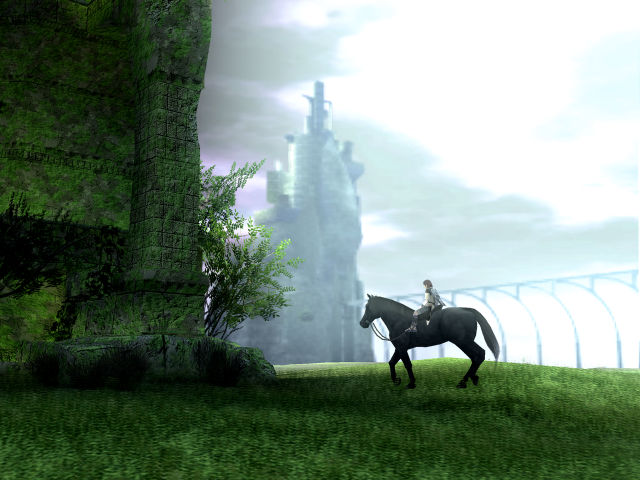Storytelling in video games
By just_nonplussed 21 Comments
Currently there is a strong push from a vocal minority of game designers to advance the technocratic medium of computer games' storytelling capabilities.
Designers such as David Cage (Heavy Rain) have been very outspoken about their passions and desires for a narrative equivalent to film and literature.
However, games have always told stories, a lot of them have told stories well, and a lot of them evoke the emotions of the player. Most of these stories are fairly similar because most developers design their games with accordance to genre and not some crazy, spontaneous idea.
Designers have worked mostly on the stability and integrity of the game language (Controls, Perspective, Environment) to improve the player experience, and in parallel have perfected telling the story of the warrior, the soldier, or the super-being. The player is this victorious warrior character. On that journey you feel frustration at losing, ambition to succeed, joy at victory. You want to protect the character because they are the key to your success within the game.
Another designer, Paul Cuisset, (Of Flashback fame) has recently stated his intent to put the player into a different story. Like David Cage he is sick of the abundance of gun games and careless violence. His current game, Amy, focuses on the dilemma of a young girl with learning difficulties and mysterious powers.
I think what Cage and Cuisset (Both of French origin) have in common is a desire to borrow from film and literature in order to gain the required experience to write deep characterization and compose carefully orchestrated scripts that the player experiences; in doing so they wish to evoke deeper emotions, most prominently sadness but also fear and perhaps some more subtle feelings.
Personally speaking, my problem with adventure games, and 'post-adventure' games such as Heavy Rain, is that they tend to sacrifice player agency in favour of the story of the character. When I play Heavy Rain I feel like I'm playing a game that is trying too hard to pretend it's a film.
There have been attempts by other developers such as Bioware to integrate multi-branching dialogue trees, but the storytelling techniques and visual presentation in many of that studio's games tends to feel stilted and mechanical. You get quite a lot of choice but often at the price of everything else. Bioware games strike me as cheesy B-movies contained in aging genre tropes.
I often believe that Nintendo tells the best stories, largely because they have the most experience with the medium and they know the ins and outs of world design and how to create compelling experiences for the player. Super Metroid, Zelda: A Link to the Past, and Super Mario World remain some of the most expertly constructed game narratives that never sacrifice play.
However, is there a compromise between the Heavy Rains and the Noby Noby Boys? Between the Cinematic script and the total sandbox? More importantly, is there a language that exists that is capable and stable enough to leverage a composed work with the whims and instinct of the player?
I believe there is at least one game today that does that.
Shadow of the colossus is a game that tells the story of a character with no character. Yet we do see his motivations and ambitions, and we do follow his path. He talks very little but has a voice. Somehow it's as if we are already the character even before the game has begun – there is no apparent disconnect.
When beginning the game, we're shown the path the character, wander, has taken to get to make it to the point where we can take over. Even though we're watching a cut-scene we can still move the camera around and zoom in. Player control is not sacrificed
The story is simple, which is key to the success of Colossus. The boy has a girl whom he wishes to bring back from the dead. He has traveled far to a foreign land that seems different...Magical even. He makes a mysterious and somewhat blind pact with the Gods of that land, because there exists a possibility that the Gods can bring the girl back to life. From this moment the player is generally set free. They understand the motivation and the goal, but there is a core mystery that compels the player-character relationship. Answers are hidden.

It's very beautiful that the cut-scenes transition seamlessly into gameplay in the same way that Wander transitions into the player. It feels kind of like a film that you're playing but also like a legitimate interactive experience.
You can move around freely once the initial cut-scene fades, and your horse awaits you. The important thing to note at this point is there are no camera cuts or annoying tutorials, or any further dialogue. You are left to roam about with your horse and explore the land and the interactions you can have. The beauty of this is that there is a whole map that is open right from the beginning with no process of unlocking needed. It's similar to Miyamoto's play worlds, but it feels like a natural and real environment made of stone and earth. It's not as abstract and irrational as Super Mario World; it feels like a living painting that you can explore and experiment in before you take on the mission that you've committed to – killing the colossi.
Seamless cut-scenes introduce each Colossi, enhancing the film-like feel while not getting carried away with it. These are the scripted elements in the story – the confrontations with the monster. Even though these are scripted the core interaction (Clinging) and the free camera movement with no cuts to gameplay keep the action centered around the player and keep the player in that world. Each contest with the monster is messy and feels like murder. Players tend to react in similar ways, and feel guilt and even remorse at slaying the creatures. Each successive kill makes the narrative feel more heavy and has a great build-up to the final fight.
After killing the Collossus another mysterious cut-scene concludes that episode. Wonderfully, as Wander you can move around right up until you are stung with the weird black tentacle that renders the character unconscious, bringing the player neatly onto the next segment. This very delicate handling is key to the game's internal logic and creates a sense of clarity and trust.
After each battle the player can either move directly onwards or explore the map. This is the core beauty of the narrative, in that it has its script but allows player agency. Not many other games come to my mind that have their cake and eat it; that create such a clarity and sense of internal order as Shadow of the Colossus. Using the available language wisely it strikes an unbelievable balance between freedom and control; between the players' feelings and the designer's concept.

21 Comments